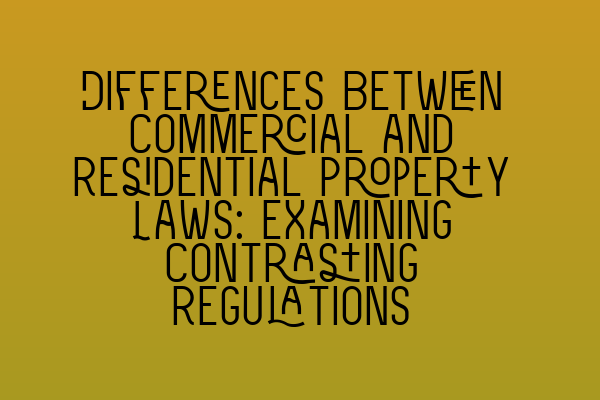**Differences Between Commercial and Residential Property Laws: Examining Contrasting Regulations**
Welcome to SQE Property Law & Land Law! As solicitors specializing in property law, we understand the importance of having a comprehensive understanding of the differences between commercial and residential property laws. These two areas of law have contrasting regulations that must be carefully navigated in order to ensure that our clients’ interests are protected.
In this blog post, we will explore the key differences between commercial and residential property laws, highlighting the unique regulations that apply to each sector. By gaining a deeper understanding of these distinctions, you will be better equipped to handle property transactions and legal matters with confidence.
**1. Ownership and Use**
One of the primary distinctions between commercial and residential property laws lies in the ownership and use of the property. Commercial properties are typically owned by businesses or organizations and are used for commercial purposes such as offices, retail spaces, or industrial sites. On the other hand, residential properties are owned by individuals or families and are primarily used for residential purposes, such as homes, apartments, or condominiums.
**2. Lease Agreements**
Another significant difference between commercial and residential property laws is the nature of lease agreements. Commercial lease agreements tend to be more complex and can span several years, often including detailed provisions regarding rent, maintenance responsibilities, and property improvements. On the contrary, residential lease agreements are typically shorter in duration and governed by specific regulations designed to protect tenants’ rights.
**3. Protection and Regulations**
The level of protection and regulations afforded to commercial and residential properties also differ. Commercial properties are subject to fewer regulations compared to residential properties. This is because commercial property transactions involve sophisticated parties who are presumed to have the knowledge and expertise to protect their own interests. Residential properties, however, receive greater protection due to the vulnerability of individual homeowners or tenants.
**4. Landlord and Tenant Rights**
Landlord and tenant rights form an essential aspect of property law. In commercial property law, landlords and tenants have more flexibility in negotiating lease terms, as the law tends to favor freedom of contract. Legal disputes in commercial leases are typically resolved using contractual clauses or through legal action. Conversely, residential tenancies are heavily regulated to protect tenants from unfair practices, and tenants have specific rights, including the right to a habitable living space, security of tenure, and protection against unfair eviction.
**5. Financing and Tax Considerations**
Financing and tax considerations also vary between commercial and residential properties. Commercial property financing often involves more complex arrangements, such as commercial mortgages or commercial loans. Tax implications for commercial properties can be more intricate as well, including considerations for capital gains tax, business rates, and value-added tax (VAT). Residential properties, on the other hand, are usually financed through residential mortgages and may have different tax implications, such as stamp duty land tax.
**Conclusion**
Understanding the differences between commercial and residential property laws is crucial to effectively navigate the complexities and regulations associated with each sector. Whether you are involved in commercial property transactions or residential property matters, SQE Property Law & Land Law can provide expert guidance and support to ensure that your interests are protected.
If you’re interested in expanding your knowledge of contract law, we invite you to explore our related articles:
– [Interactive SQE Mock Tests for Contract Law: Test Your Knowledge](https://contract-law-sqe.co.uk/interactive-sqe-mock-tests-for-contract-law-test-your-knowledge/)
– [Join Our SQE Contract Law Webinars: Expert Insights and Guidance](https://contract-law-sqe.co.uk/join-our-sqe-contract-law-webinars-expert-insights-and-guidance/)
– [Contract Law Reforms: An Analysis of Recent Changes](https://contract-law-sqe.co.uk/contract-law-reforms-an-analysis-of-recent-changes/)
– [Parties in a Contract: Rights and Responsibilities](https://contract-law-sqe.co.uk/parties-in-a-contract-rights-and-responsibilities/)
– [The Importance of Ethics in Contract Law: A Comprehensive Guide](https://contract-law-sqe.co.uk/the-importance-of-ethics-in-contract-law-a-comprehensive-guide/)
Feel free to explore our website for more valuable insights and resources related to property law. If you have any specific queries or require legal assistance, do not hesitate to get in touch with SQE Property Law & Land Law. We are here to help you navigate the intricacies of property law with professionalism and expertise.
